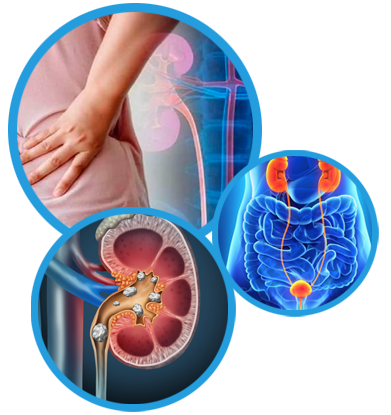
Chronic Kidney Disease
Chronic kidney disease (CKD) is a progressive condition characterized by the gradual loss of kidney function over time.
It is a significant global health concern, affecting millions of people worldwide.
CKD can lead to serious complications, including kidney failure, cardiovascular disease, and other systemic complications.
It is a significant global health concern, affecting millions of people worldwide.
CKD can lead to serious complications, including kidney failure, cardiovascular disease, and other systemic complications.
1. Symptoms:
Symptoms of chronic kidney disease may include:
- Fatigue and weakness
- Swelling of the legs, ankles, feet, or face (edema)
- Difficulty concentrating
- Decreased appetite
- Frequent urination, especially at night
- Persistent itching
- Muscle cramps or twitches
- High blood pressure
- Changes in urine output (increased or decreased)
- Blood in the urine (hematuria)
2. Causes:
Chronic kidney disease can be caused by various factors, including:
– Diabetes mellitus, particularly uncontrolled high blood sugar levels
– Hypertension (high blood pressure)
– Glomerulonephritis, inflammation of the kidney’s filtering units
– Polycystic kidney disease, a genetic disorder characterized by the growth of cysts in the kidneys
– Kidney infections or urinary tract obstructions
– Autoimmune diseases such as lupus or vasculitis
– Certain medications or toxins that damage the kidneys over time
– Aging and genetics may also play a role in the development of CKD.
3. Diagnosis:
– Diagnosis of chronic kidney disease typically involves a combination of medical history, physical examination, and diagnostic tests.
– Common diagnostic tests for CKD include blood tests to measure kidney function (creatinine, blood urea nitrogen), urine tests to check for protein or blood in the urine, and imaging tests such as ultrasound or CT scan to evaluate the structure of the kidneys.
– A kidney biopsy may be performed in some cases to assess the extent of kidney damage and determine the underlying cause of CKD.
– Common diagnostic tests for CKD include blood tests to measure kidney function (creatinine, blood urea nitrogen), urine tests to check for protein or blood in the urine, and imaging tests such as ultrasound or CT scan to evaluate the structure of the kidneys.
– A kidney biopsy may be performed in some cases to assess the extent of kidney damage and determine the underlying cause of CKD.
4. Conclusion:
– Chronic kidney disease is a serious and progressive condition that requires ongoing management and treatment.
– Treatment options for CKD may include lifestyle modifications (such as diet and exercise), medications to control blood pressure and manage symptoms, and in some cases, dialysis or kidney transplant.
– Early detection and intervention are crucial for slowing the progression of CKD and preventing complications.
– Support from healthcare providers, family, and friends can play a crucial role in managing CKD and improving quality of life for affected individuals.
– Education about kidney health and preventive measures is important for reducing the burden of CKD on individuals and healthcare systems.
– Treatment options for CKD may include lifestyle modifications (such as diet and exercise), medications to control blood pressure and manage symptoms, and in some cases, dialysis or kidney transplant.
– Early detection and intervention are crucial for slowing the progression of CKD and preventing complications.
– Support from healthcare providers, family, and friends can play a crucial role in managing CKD and improving quality of life for affected individuals.
– Education about kidney health and preventive measures is important for reducing the burden of CKD on individuals and healthcare systems.
Satisfied Patients
0
K+
Surgeries Performed
0
+
Years of Experience
0
+
Current News & Event
Free Health camp
Lions Club Bhagalpur Gold invites you to a free health camp in which the focus will be on urological problems.
This camp will take place this Sunday, April 14, 2024 from 9 am to 1 pm.
This camp will take place this Sunday, April 14, 2024 from 9 am to 1 pm.

KIDNEY STONE, URINARY BLADDER STONE, URINARY TRACT INFECTION, LOW TESTOSTERONE, PROSTATE CANCER, KIDNEY CANCER, RENAL CYST.
KIDNEY STONE, URINARY BLADDER STONE, URINARY TRACT INFECTION, LOW TESTOSTERONE, PROSTATE CANCER, KIDNEY CANCER, RENAL CYST.





